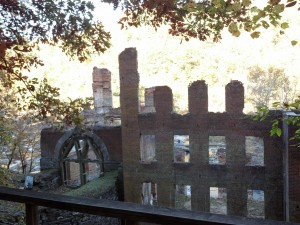Reflections on relocating (Part 1)
16 December 2014 – Adina Langer

Sweetwater Creek State Park, near my new hometown of Atlanta, includes the ruins of a textile mill, which was destroyed by Sherman’s advancing army. Photo credit: Adina Langer
Almost exactly four months ago, I relocated from Lansing, Michigan, to Atlanta, Georgia. Although both are capital cities, Lansing and Atlanta have little else in common. I traded the Midwestern winter and speedy grid-like roadways for mild autumn breezes through dense tree-cover and much-to-be-avoided traffic-choked interstates. Of course I also traded a dominant heritage of the fur trade, mid-19th-century westward expansion, and the rise and fall of the auto industry with one of British colonialism, railroads, the Civil War, Reconstruction, and Civil Rights. I also traded one public history community for another. In this post, I share my first impressions and aspirations. In nine months, I will report again on my progress toward my goals.
Since moving to Atlanta, I have felt welcomed by my new colleagues at the numerous local colleges, universities, and historical institutions. There are some neat collaborations already underway in this metro area (see Brennan Collins’ recent post on Stadiumville and the ATL maps project). But there is always room for more. To that end, and with encouragement from colleagues based at Georgia State and Kennesaw State universities, I spearheaded an informal gathering of public historians at a local watering hole. It is rare in my experience to have this kind of collegial social interaction outside of the conference setting. This first in a set of what we are hoping to be monthly occurrences brought together two independent consultants, three museum professionals, and five educators (although there were only six individuals present–you do the math). We are hoping to expand in future months to welcome more members of the public history community.
We traded jokes about things “overheard on campus,” shared stories about the challenges of interpreting politically charged histories, and revealed aspirations for current and future projects. The atmosphere was jovial, and yet I still found it difficult to define myself as a newcomer to the neighborhood. My colleagues were working on exciting projects: a new edition of the Encyclopedia of Local History, an exhibit on “Atlanta in 50 Objects” at the Atlanta History Center, an Agnes Scott College oral history project at a home for the elderly, a planned “radical salon” for a 1945-present US history survey class, innovative education programs at the Museum of History and Holocaust Education, a coffee table book about the Georgia governor’s mansion and its residents, and digital history classes aimed at different academic levels.
Yes, I have filed the necessary paperwork to move my consulting business from Michigan to Georgia, but other than a very exciting teaching opportunity in the spring, I have yet to land any local projects, paid or otherwise. I’ve always felt that some time is needed to test the waters in a new place, and networking is always a good starting point. However, I also need to overcome my shyness about soliciting new jobs and set myself some goals for the new year.
Therefore, in the spirit of the season, I resolve to:
1) Send out resumes to all institutions at which I think it would be interesting to do projects.
2) Identify some successful area historical consultants and take them out for coffee to pick their brains. (I am grateful to already have a meeting scheduled with Mary Beth Reed of New South Associates.)
3) Make time at least one day per week to work on my own long-term research projects.
4) Continue to organize monthly public historians’ get-togethers, expanding the circle in the new year, and research other successful regional consortiums of public historians (such as the Northwest History Network) for inspiration.
5) Nurture my contacts from the places I’ve lived before my relocation.
7) Revisit past projects for new opportunities, thinking of my consulting career as a long-term goal and not a series of short-term successes or failures.
8) Update and revitalize my website and social media presence to increase my “Googleability.”
I am hopeful that this strategy will nurture my relationship with my new community while not burning bridges to my past communities. It’s hard to be “always on” as a consulting public historian, but it’s useful to frame each new experience in an expansive light. I welcome feedback from others who have shared my experience of relocating at various stages in their careers.
~ Adina Langer is a public history consultant based in Atlanta, Georgia, and part-time instructor in the Heritage Preservation Program at Georgia State University. You can follow her on Twitter @artiflection and learn more about her at her website.




Thank you for your comments Ms. Langer. I am currently getting ready to relocate for a career in public history too (Finally-after two MA’s). I knew it would come to this, but it’s not easy as I’m struggling with leaving friends and family behind. I’ve printed out your resolution list in order to help me with the emotional issues that will most certainly come when it comes time to say goodbye to PA.
Val